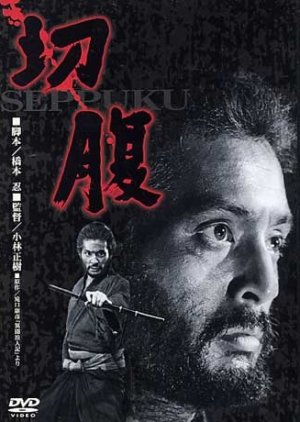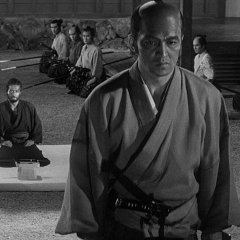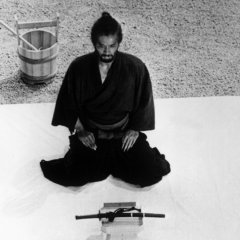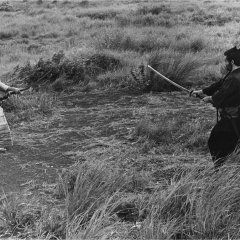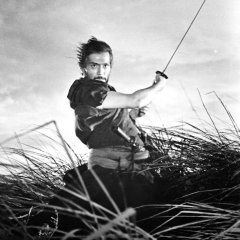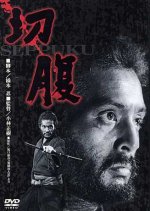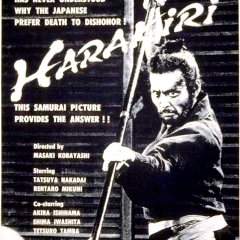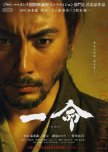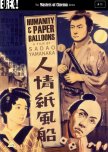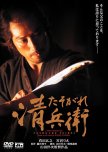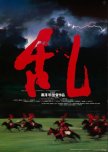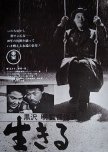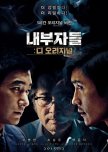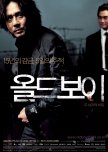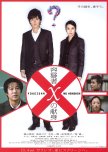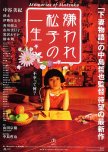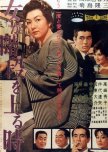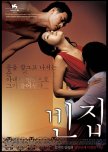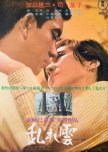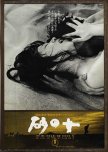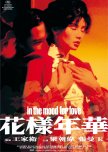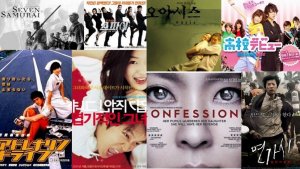 Staff Pick of the Month - Favorite Movies Edition
Staff Pick of the Month - Favorite Movies Edition - Română
- English
- magyar / magyar nyelv
- dansk
- Titlu Nativ: 切腹
- De asemenea cunoscut ca și: Seppuku ,
- Regizor: Kobayashi Masaki
- Scenarist: Hashimoto Shinobu
- Genuri: Istoric, Psihologic, Politic
Cast și credite
- Nakadai Tatsuya Rol Principal
- Iwashita ShimaTsugomo MihoRol Principal
- Tanba Tetsuro Rol Principal
- Mikuni Rentaro Rol Principal
- Ishihama Akira Rol Principal
- Mishima MasaoInaba TangoRolul de Sprijin
Recenzie

This review will probably be my longest up to date. Bear with me because I have to put this film in its right temporal and spatial frameworks before talking about the film itself. If you’re not interested in history, you can skip the first two paragraphs and get to the film’s specific review.
I am history lover so it’s a given that I studied Japanese history way before I started watching Japanese classics and that knowledge in history helped me a lot when I started exploring the golden Japanese cinema. Seppuku is set at the beginning of the Edo era (17th century), an age of peace that lasted for more than 250 years in Japan where the Samurai class gradually lost the “warrior” side of their positions since there weren’t any wars to fight. As Tokugawa (the general who established his shogunate in Edo) gained complete control over Japan; many Samurai who fought the Sekigahara battle and others were left without clans to serve and were called “Ronin” meaning masterless Samurai. They were usually viewed as bandits whether intentionally or unintentionally, they lived in poverty but they didn’t lose their “samurai nobility” that’s still a higher rank than the peasants’ class. They also never gave up on their honorable ethics and beliefs.
In that era, many Ronin’s started to visit clans to request a “Seppuku” in their clans’ yard, meaning a ritual suicide where the Samurai has to literally disembowel himself using his Shinto (the Samurai in that era has a long Sword Katana and a smaller one Shinto that he always carry around with him, they’re considered as big part of his Samurai honor). The Harakiri (ritual suicide) is in fact an honorable death for a Samurai so it was dishonorable for clans to reject such a noble request from Ronins but they also didn’t want to let them kill themselves on their property so they either hired them as their clans’ Samurai (but that didn’t happen a lot since it’s an era of peace so the clans didn’t need many Samurai considering the fact that there’s no war) or they just gave them money and sent them away. As other Ronin heard about the story, they started to frequently visit clans in order to request a Seppuku but they never actually meant to kill themselves, they just wanted to take the money and leave. And that’s what’s called “Harakiri fraud” which is a cowardly, shameful act from a Samurai even if he’s a Ronin.
The history stops there although the clan that’s mentioned in this film (The Iyi clan) is a real clan that’s known as a very important figure in modern Japanese history. Now, let’s talk about the film itself; one clan (the Iyi clan) decided to stop these Harakiri frauds and made the Samurai who asked to commit seppuku kill himself so that other Ronin won’t dare show up in front of their clan. That’s how the story starts but through flashbacks, we get the overall story of that man, where he came from and why he came. His circumstances, his situation and his life were all told using flashbacks that were amazingly illustrated in order to produce spectacular turns of events.
Seppuku is a human Samurai film that deals with old Japanese codes of honor and ethical Samurai principles. Kobayashi wanted to introduce a somewhat anti-samurai film that deals with the shortcomings of some Samurai beliefs by using quotes such as “After all, this thing we call samurai honor is ultimately nothing but a façade” (said by Tsugumo Hanshiro) but then he comes back to insist on the codes of dignity. Unlike many Kurosawa films’ I saw where he always idolizes the Samurai figure. Don’t get me wrong, Kurosawa’s films are my favorites but what I meant to say is that Kobayashi and Kurosawa’s adaptations of Samurai stories are quite different even if they’re comparable, to each his own genius ideas of making masterpieces.
The film contained the sword fighting but it wasn’t the main focus of this film. The developments were surprising and quite intriguing to follow; in this film you get a taste of suspense, psychology, action, tragedy, revenge and even family. Although the film insists on the Samurai element more than anything else, it also focuses on family relationships, interactions and sacrifices as well as human and more specifically Samurai emotions.
If I keep talking then I won’t stop praising this film’s screenwriting by Shinobu Hashimoto and the original novel by Yasuhiko Takiguchi. I appreciated every angle of the story and the way it revealed facts at the most unexpected time. This is not a film that’s set to kill a Samurai through a ritual suicide or show the audience how a Samurai disembowel himself; it’s a film that describes the human emotions and feelings behind that act. However, I do understand if some people found the development a bit slow. As for me, my eyes were glued to the big screen the whole time without a single move or sound. Yes, it had that kind of impact on me.
The acting, oh my! what on earth can I say about that acting? I am not biased or someone who talks with full subjectivity so when I say that Nakadai was marvelous in this, I am not talking with a fangirl’s emotions, I am speaking with full objectivity about a Japanese legend. For me or anyone who knows classic Japan, Nakadai Tatsuya is a legendary star in the Japanese cinema and one hell of a charismatic astounding actor who can grab your intention in a split of a second. Like many of his other roles, Nakadai was amazing in this; his portrayal of Tsugumo Hanshiro’s character was flawless. Enough said or I won’t stop talking about that man’s incredible acting skills.
Other actors were also amazing; I was moved by their acting skills. It’s the golden Japanese era of cinema so it’s a given that only high-class acting exists. The characters were very well written and their relationships were fascinating to follow, I was moved by many characters’ developments in Seppuku.
Now let me talk about that breathtaking cinematography. I like to focus on cinematography while watching films and even though this was produced in 1962 (black and white); I was charmed by the back sceneries and great settings. Kobayachi did an awesome job with those mesmerizing takes that I will never forget.
I have to mention the soundtrack which I believe it’s the best music composure I ever heard in any Japanese classic.
Watch this if:
-You like Japanese classics or want to discover them.
-You enjoy Samurai films but keep in mind that this isn’t an action film.
-You love films with human stories.
-You like Masaki Kobayashi because this is his finest work.
-You like Nakadai Tatsuya because this is one of his best performances.
Do not watch if:
-You dislike Japanese classics.
-You dislike Samurai films.
To end my super long review, I will mention that Harakiri is a crafted masterpiece by Kobayashi and an eternal gem of the Japanese classic cinema that’s bound to take you through a great journey of amazing events and astonishing acting skills.
I will leave you with two quotes by Tsugumo Hanshiro:
“What befalls others today may be your own fate tomorrow.”
“The suspicious mind conjures its own demons.”
Considerați utilă această recenzie?

The best Anti-Samurai film to be ever made...
Unemployment has always been a tragic consequence of change and modernisation. What if this situation occurred at a time when there was no pension, no unemployment benefits and the moral code was not able to keep up with the times?To me Harakiri had elements of a job interview gone horribly wrong. Considering the past two pandemic years where a lot of people became jobless, this movie hits close to home and makes me feel really thankful that we live in different times.
Story:
The time is 1630 - Japan. We have a ronin (wandering unemployed samurai) Tsugumo, who goes to a clan house and requests permission to kill himself i.e commit Harakiri. The clan elder Saito tells him a story designed to discourage this but the tables are turned when Tsugumo skilfully humiliates the leader in front of his retainers.
This is an anti-establishment film that portrays the flawed bushido code hiding behind a facade of honour and morality. It depicts the tragic circumstances surrounding ritual suicide and provides a potent message which I think is relevant as long as authoritarian regimes exist in this world. We are all born into a system that influences our thinking and behaviour. Be it cultural or political, the system defines our actions and when we are faced with an ethical dilemma it can challenge what we think to be right or wrong. A similar situation forces Tsugumo to give up his ideals and deal with it in the only way he knows - sepukku/ harakiri.
The story is poignant and the thought evoking screenplay by acclaimed screenwriter Shinobu Hashimoto is brought to life by Kobayashi in an extremely mesmerising narrative structure with some beautiful stills and graceful cinematography by Yoshio Miyajima.
Acting:
Tatsuya Nakadai as Tsugumo delivers a flawless performance. His calm demeanour in the initial sequence really brings in the sombre mood of the film.
Mikuni Rentaro does a splendid job as Saito. The acting in this film overall is superb but the direction by Kobayashi elevates this film to brilliance.
Overall:
There are a lot of symbolic shots during the opening and closing sequences that reflect the tarnished glory of feudal Japan. History is written by the victors and the ending shot of the samurai armour sears it into the minds of us viewers as it brings forth the hypocrisy of feudal Japan.
With a brilliant screenplay, an amazing director and the wonderful acting of every cast member, this is undoubtedly one of the most thought provoking samurai film to be ever made!
A solid 10 from me.
Considerați utilă această recenzie?

